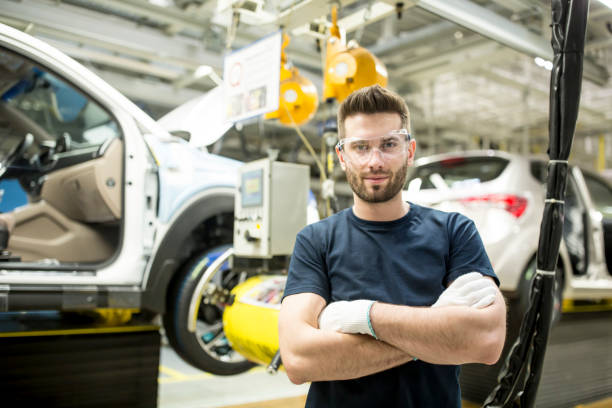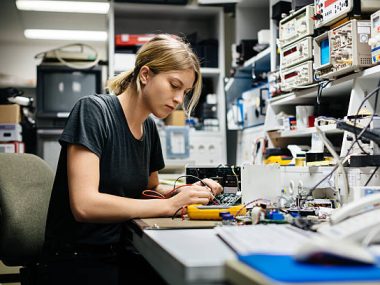How many jobs are available in auto manufacturing? The auto manufacturing industry plays a significant role in global economies, employing a vast workforce and contributing to technological advancements and innovation.
For individuals seeking employment in this industry, understanding the job market and the number of available opportunities is crucial.
The question of how many jobs are available in auto manufacturing arises as job seekers, students, and professionals alike seek to make informed decisions about their career paths.
Auto manufacturing encompasses the production, assembly, and distribution of automobiles, encompassing a wide range of activities such as design, engineering, manufacturing, quality control, logistics, and more.
The industry consists of both large-scale automobile manufacturers and a network of suppliers and support services, creating a complex ecosystem of employment opportunities.
In this article, we will delve into the world of auto manufacturing jobs.
Whether you are considering a career change or contemplating your educational path, this article aims to provide valuable insights and information about the abundance of job opportunities within the auto manufacturing sector.
Also Read:
How Many Jobs Are Available in Home Furnishings?
How Many Jobs Are Available in Military/Government/Technical?
How Many Jobs Are Available in Auto Manufacturing?
The auto manufacturing industry is a major employer worldwide, providing a significant number of job opportunities across various sectors.
The exact number of jobs available in auto manufacturing fluctuates over time due to factors such as market demand, technological advancements, and economic conditions.
Historically, auto manufacturing has been a source of substantial employment.
Large-scale automobile manufacturers employ thousands of workers in their production facilities, where jobs range from assembly line workers to skilled technicians and engineers.
Additionally, the industry creates a ripple effect, supporting numerous indirect jobs in areas like supply chain management, logistics, marketing, and sales.
However, the number of jobs available in auto manufacturing can be influenced by various factors.
Technological advancements, such as automation and robotics, have led to increased efficiency and productivity, resulting in changes to the workforce composition.
While some job roles have been replaced by machines, new positions have emerged, requiring expertise in areas like robotics programming, data analysis, and electric vehicle technology.
Furthermore, economic factors and market conditions significantly impact job availability.
During periods of economic growth, consumer demand for vehicles increases, leading to expanded production and, subsequently, more job opportunities.
Conversely, economic downturns can lead to production cuts, downsizing, and fewer job openings in the industry.
In recent years, the auto manufacturing industry has experienced transformations driven by the shift towards electric vehicles (EVs) and the growing emphasis on sustainability.
This transition has created new employment prospects in areas such as battery manufacturing, EV engineering, and charging infrastructure development.
Overall, while the exact number of jobs available in auto manufacturing fluctuates, the industry continues to be a substantial source of employment, offering diverse opportunities for individuals with various skill sets and interests.
Monitoring industry trends, staying abreast of technological advancements, and acquiring relevant skills will enhance one’s prospects of securing a rewarding career in this dynamic field.
Growth and Trends in Auto Manufacturing Employment
The auto manufacturing industry has witnessed both growth and evolving trends in employment.
Technological advancements, including automation and robotics, have influenced the industry’s workforce composition.
While some traditional job roles have been replaced by machines, new positions requiring expertise in areas such as robotics programming and electric vehicle technology have emerged.
The shift towards electric vehicles has created additional job opportunities in battery manufacturing, EV engineering, and charging infrastructure development.
Furthermore, the industry’s focus on sustainability and the integration of advanced technologies, such as artificial intelligence and connectivity, are expected to shape future employment trends.
Staying updated on these developments and acquiring relevant skills will be crucial for professionals seeking to thrive in this evolving field.
Job Requirements and Qualifications in Auto Manufacturing
Job requirements and qualifications in auto manufacturing vary depending on the specific roles and responsibilities.
Entry-level positions typically require a high school diploma or equivalent, with on-the-job training provided.
For technical and skilled positions, such as automotive technicians or engineers, post-secondary education in automotive technology, engineering, or a related field is often required.
Certifications from recognized organizations may also be necessary to demonstrate proficiency in specific areas.
Additionally, strong problem-solving skills, attention to detail, manual dexterity, and the ability to work in a fast-paced environment are valued qualities.
As technology continues to advance, familiarity with computer systems, data analysis, and knowledge of electric and hybrid vehicles are becoming increasingly important qualifications in the auto manufacturing industry.
Challenges and Opportunities in Auto Manufacturing Employment
Auto manufacturing employment presents both challenges and opportunities.
One major challenge is the impact of automation and technological advancements, which can lead to job displacement and require workers to acquire new skills.
Additionally, economic fluctuations and global competition can affect job stability. However, the industry also offers opportunities for growth.
The transition to electric vehicles opens avenues for employment in battery manufacturing and EV technology.
Moreover, the demand for skilled technicians, engineers, and professionals in emerging fields like autonomous vehicles and connectivity creates new job prospects.
Adapting to evolving technologies, upskilling, and embracing innovation can help individuals navigate these challenges and seize opportunities in auto manufacturing employment.
Also Read:
Can I Get a Mortgage with Unfiled Taxes?
Is Mortgage Forbearance a Good Idea?
Conclusion
The auto manufacturing industry offers a significant number of job opportunities across various sectors.
The exact number of jobs available fluctuates due to factors such as market demand, technological advancements, and economic conditions.
However, the industry remains a substantial source of employment, providing diverse roles for individuals with different skill sets and interests.
The shift towards electric vehicles, technological advancements, and the emphasis on sustainability are shaping the future of auto manufacturing employment.
By staying informed about industry trends, acquiring relevant skills, and adapting to changing technologies, individuals can position themselves for rewarding careers in this dynamic field.
The auto manufacturing industry continues to evolve, presenting both challenges and opportunities for those seeking employment within its vast and evolving ecosystem.






